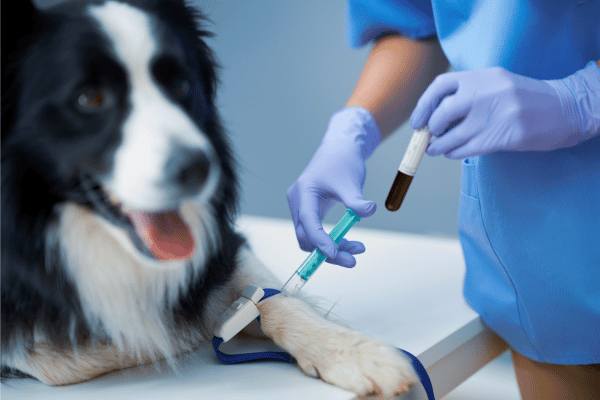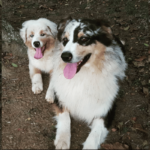Embracing the golden years of our canine companions involves dedicated care and profound understanding. Caring for Mature Dogs encompasses a holistic approach to health, diet, and exercise, ensuring their later stages of life are filled with comfort, joy, and vitality.
Essential Health Tips for Senior Dogs

Nurturing a senior dog requires a tailored approach. Regular veterinary check-ups become indispensable, ensuring early detection of age-related issues. Transitioning to a senior-specific diet offers tailored nutrition, addressing their changing metabolic needs. Supplements like glucosamine can also support joint health, maintaining mobility and comfort. Such proactive health measures significantly contribute to their overall well-being, allowing them to thrive in their senior years.
Exercise remains pivotal for mature dogs, albeit with adjusted intensity. Shorter, more frequent walks suit their endurance levels better, preventing overexertion while promoting cardiovascular health. Cognitive exercises, through interactive toys and simple training routines, keep their minds sharp. Balancing physical and mental stimulation not only enhances their quality of life but also fortifies the bond between pet and owner, enriching the shared journey through their golden years.
Caring for Mature Dogs also means adapting their living environment. Comfortable bedding eases joint stress, while ramps or steps reduce strain on aging limbs. Such modifications ensure their space is both safe and accessible, reflecting our commitment to their comfort and dignity. Emphasizing gentle care, patience, and understanding, we can make their senior years truly golden, filled with love, companionship, and cherished moments.
Diet Adjustments for Aging Canine Companions
As dogs age, their dietary needs evolve. A shift towards foods rich in fiber aids in maintaining optimal digestive health, crucial for senior dogs. Incorporating omega-3 fatty acids, found in fish oils, can help combat inflammation, benefiting joint health and cognitive function. This careful consideration in diet adjustments ensures they receive the necessary nutrients to support their aging bodies, promoting longevity and enhancing their life quality in their mature years.
Hydration is paramount for mature dogs, as it supports kidney function and overall health. Ensuring easy access to fresh water encourages regular intake, vital for their well-being. Introducing moist foods can also aid in hydration, especially for those with decreased thirst drive. Such simple, thoughtful changes in their hydration and feeding routines can significantly impact their comfort and health, underscoring the importance of attentive care for our aging canine friends.
Monitoring weight is crucial for senior dogs, preventing obesity and its associated health risks. Regular weigh-ins, coupled with appropriate portion control, ensure they maintain a healthy weight. This vigilance helps in mitigating the strain on their joints and organs, vital for preserving mobility and overall health. Through mindful feeding practices and regular health assessments, we can safeguard their well-being, ensuring they enjoy their senior years to the fullest.
Enhancing Exercise Routines for Mature Dogs

Tailoring exercise to a mature dog’s capacity is key. Gentle walks, tailored to their pace, offer both physical and sensory stimulation without overwhelming them. Integrating low-impact activities, like swimming, can provide a beneficial workout, minimizing joint stress. This thoughtful adaptation in their exercise regimen acknowledges their limitations while promoting essential physical activity, maintaining their muscle tone and mental well-being, crucial aspects of Caring for Mature Dogs.
Consistency in exercise routines brings immense benefits to aging dogs. Establishing a regular, manageable schedule helps maintain their circadian rhythm, contributing to better sleep and overall health. It’s important to observe their responses, adjusting activities to avoid fatigue or discomfort. Such dedicated attention to their physical needs reinforces our commitment to their well-being, ensuring they continue to lead active, fulfilled lives even as they navigate their senior years.
Flexibility in exercise routines is equally important, allowing adjustments based on their daily energy levels and health status. Incorporating variety, such as different walking routes or gentle play sessions, keeps them engaged and mentally stimulated. This adaptability in caring for mature dogs ensures their physical activities remain a source of joy and enrichment, fostering a deeper bond between pet and owner while supporting their overall health and happiness.
Prioritizing Mental Health in Senior Dogs
Mental stimulation plays a critical role in caring for mature dogs, safeguarding their cognitive health. Engaging them in problem-solving games and new, gentle training exercises can significantly enhance their mental agility. Such activities not only provide entertainment but also prevent cognitive decline, ensuring their minds remain as active as their bodies. This proactive approach to mental health is essential for maintaining their overall well-being and zest for life.
Social interactions are invaluable for senior dogs, bolstering their emotional health. Arranging playdates with other dogs, when appropriate, or encouraging interactions with humans can uplift their spirits. These social engagements combat loneliness and stimulate their minds, contributing to their emotional and psychological well-being. It’s crucial to tailor these interactions to their comfort level, ensuring they’re positive experiences that enrich their senior years with joy and companionship.
Routine plays a comforting role in the lives of mature dogs, offering a sense of security and stability. Maintaining a consistent schedule for meals, walks, and rest can alleviate stress and anxiety, contributing to their overall tranquility. This consistency in their daily lives, coupled with the loving presence of their caregivers, provides a nurturing environment that supports their mental and emotional health, highlighting the importance of stability in Caring for Mature Dogs.
Comfort Measures for Aging Dogs at Home

Creating a comfortable home environment is paramount for senior dogs. Investing in orthopedic beds can significantly reduce discomfort from arthritis and other joint issues. These beds provide the necessary support for their aging bodies, ensuring restorative rest. Additionally, keeping their living area warm and draft-free contributes to their comfort, especially in colder months. Such measures demonstrate our dedication to their well-being, ensuring their living space adapts to their evolving needs.
Accessibility enhancements within the home can greatly improve the quality of life for mature dogs. Installing ramps or stairs facilitates easier access to furniture or vehicles, minimizing the risk of injury from jumping or climbing. Non-slip flooring is also crucial in preventing falls, particularly in areas prone to wetness. By modifying our homes to suit their age-related limitations, we provide a safe and nurturing environment that respects their dignity and independence.
Regular grooming holds increased importance for aging dogs, supporting skin health and overall comfort. Gentle brushing promotes circulation and removes dead fur, contributing to their well-being. It’s also an opportunity for bonding and for checking any new lumps or skin issues. Adapting grooming techniques and frequency to their tolerance levels ensures this necessary care remains a positive experience, reinforcing our commitment to their comfort and health as they age.
Regular Veterinary Care for Senior Dogs
Consistent veterinary check-ups are crucial for aging dogs, ensuring early detection and management of potential health issues. These visits allow for regular monitoring of their physical condition, including weight, dental health, and organ function. Tailored vaccination and parasite control plans are also adjusted to fit their changing health needs. This proactive approach to veterinary care is fundamental in maintaining their quality of life during their senior years, embodying the essence of Caring for Mature Dogs.
During these check-ups, discussions about nutrition and mobility aids can provide invaluable guidance for owners. Veterinarians can recommend specific diets or supplements that support joint health and cognitive function, addressing common concerns in senior dogs. They can also suggest physical therapies or exercises that benefit aging muscles and joints. Such personalized care plans are instrumental in addressing the unique challenges faced by mature dogs, ensuring their needs are met with expertise and compassion.
Preventive care becomes increasingly important as dogs age, involving more than just routine check-ups. Dental care, for instance, plays a significant role in preventing discomfort and systemic issues. Regular blood work and screenings can also uncover hidden conditions before they become more serious. Emphasizing preventive measures and early intervention, we can significantly enhance the well-being of our senior canine companions, ensuring they continue to lead happy and healthy lives.
Building a Supportive Community for Owners

Navigating the challenges of caring for mature dogs is a journey best shared with a supportive community. Connecting with other pet owners through forums, social media groups, or local meet-ups can provide invaluable insights and emotional support. Sharing experiences and advice on managing age-related issues fosters a sense of solidarity. This community aspect is vital, offering a network of understanding and resources that can greatly alleviate the stresses of pet caregiving.
Educational workshops and seminars can also be beneficial, offering expert advice on nutrition, exercise, and health care tailored to senior dogs. These sessions not only equip owners with knowledge but also encourage proactive engagement in their pets’ well-being. By fostering an informed and supportive community, we can enhance the quality of care provided to aging dogs, ensuring their golden years are as comfortable and fulfilling as possible.
Additionally, establishing relationships with pet care professionals, such as veterinarians, trainers, and groomers who understand the nuances of senior pet care, can be incredibly beneficial. These experts can offer tailored advice and support, guiding owners through the complexities of caring for an aging pet. Building a network of professionals ensures that both pets and their owners have the support and resources needed to navigate the challenges of Caring for Mature Dogs.
Caring for Mature Dogs: Emotional Well-being
The emotional well-being of mature dogs deserves careful attention. Recognizing and adapting to their changing emotional needs can greatly enhance their quality of life. Providing a stable, loving environment, coupled with gentle, consistent interaction, reassures them of their valued place in the family. Such emotional support is integral to Caring for Mature Dogs, helping them navigate the vulnerabilities of age with confidence and security, surrounded by love and understanding.
Sensitivity to their comfort levels during social interactions and new experiences is essential. As dogs age, they may become more sensitive to loud noises or unfamiliar situations. Ensuring their surroundings are calm and predictable can significantly reduce stress and anxiety. Introducing changes gradually and maintaining routine where possible offer them a sense of security, reinforcing the importance of a compassionate approach to their emotional needs during their senior years.
Celebrating their life and achievements, no matter how small, fosters a positive atmosphere that uplifts their spirits. Simple gestures of love, like extra cuddles or favorite treats, can make a significant difference in their day-to-day happiness. Recognizing and cherishing the unique bond shared with them honors their contribution to our lives, making Caring for Mature Dogs not just a responsibility, but a journey filled with shared love and mutual respect.
Advanced Care Strategies for Senior Dogs
As dogs reach advanced stages of life, their care requirements can become more complex. Implementing advanced care strategies, such as specialized therapies and alternative treatments, can significantly enhance their comfort and mobility. Techniques like acupuncture, massage, and hydrotherapy offer non-invasive options to relieve pain and improve circulation. These methods underscore the importance of adopting a holistic approach to Caring for Mature Dogs, ensuring their physical and emotional needs are comprehensively addressed.
Pain management is a critical aspect of caring for senior dogs, requiring careful consideration and often, a multimodal approach. Consulting with veterinarians to tailor pain management plans, including safe pharmaceuticals and supplements, can dramatically improve their quality of life. This attentive approach to alleviating discomfort allows them to enjoy their daily activities with minimal pain, reflecting the depth of our commitment to their well-being in their golden years.
End-of-life care is a delicate topic but an important aspect of caring for aging pets. Providing compassionate palliative care, focused on comfort and dignity, is essential as they approach the end of their journey. Open discussions with veterinarians about quality of life and humane options when the time comes are crucial. Navigating this final stage with empathy and respect epitomizes the true essence of Caring for Mature Dogs.
Integrating Technology in Senior Dog Care
The integration of technology has revolutionized the care of mature dogs, offering innovative solutions to enhance their well-being. GPS trackers and health monitoring wearables provide real-time insights into their activity levels and vital signs, enabling proactive management of their health. This technological advancement supports a data-driven approach to Caring for Mature Dogs, ensuring their needs are met with precision and care, tailored to their individual health profiles.
Smart home devices can also play a significant role in the daily care of senior dogs. Automated feeders ensure they receive consistent, portion-controlled meals, while pet cameras allow owners to monitor their pets remotely, ensuring their safety and comfort. This integration of technology into pet care routines offers peace of mind to owners and contributes to a stable and secure environment for aging pets, reflecting the evolving landscape of pet care.
Moreover, online platforms and mobile applications offer a wealth of resources for pet owners, from telemedicine services providing veterinary consultations to apps that track exercise and nutrition. This accessibility to information and expert advice at our fingertips empowers owners to make informed decisions regarding the care of their mature dogs. Embracing these technological tools can significantly enhance the quality of life for our senior canine companions, highlighting the importance of innovation in pet care.
Nurturing the Golden Years
As we’ve navigated the multifaceted journey of Caring for Mature Dogs, we’ve explored the importance of tailored health strategies, the impact of diet and exercise adjustments, the comfort of a supportive home environment, and the benefits of a strong community and advanced care techniques. Integrating technology into their care regime has also emerged as a crucial element, providing innovative tools to enhance their quality of life.
In these golden years, our approach to care must be enveloped in empathy, patience, and a deep understanding of their evolving needs. It’s a time to reciprocate the unconditional love and companionship they’ve offered us throughout their lives. By focusing on their health, comfort, and emotional well-being, we ensure their senior years are filled with the dignity and joy they deserve.
We encourage you, the reader, to embrace these insights and integrate them into your care routine. Whether it’s by adopting a new exercise regimen, exploring advanced care options, or simply spending more quality time with your aging companion, every small act of care counts. For more in-depth guidance and support, visit reputable sources like the ASPCA or consult with your veterinarian, ensuring your beloved pets receive the best possible care in their later years. Your feedback and stories are also invaluable—share your experiences and tips in the comments below or join online communities to connect with fellow pet lovers navigating this rewarding journey.
Reference page: How Caring for Senior Dogs Impacted One Foster Caregiver
I. Frequently asked questions about pet life stages
- What to consider before adopting a pet in old age?When adopting a pet in old age, it's important to consider the animal's energy level, necessary health care, and whether the senior's lifestyle can accommodate the pet's needs during its various life stages.
- How do pets behave in their final moments of life?In their final moments, pets may seek isolation, show changes in appetite or behavior, and need palliative care and comfort to ensure their last days are spent with dignity and as little discomfort as possible.
- What are the main nutritional supplements for pets?Key supplements can include omega-3 fatty acids for skin and coat health, glucosamine for joints, probiotics for digestive health, and antioxidants for immune support, varying according to the pet's life stage.
- How to deal with "hookworms" in pets?Treatment for "hookworms," caused by nematode larvae that infect the skin, includes antiparasitic medications prescribed by the veterinarian, as well as hygiene care of the environment to prevent reinfestations.
- What are the life stages of a dog and how to care for each?The life stages of a dog include puppy, juvenile, adult, and senior, and each stage requires specific care in terms of nutrition, exercise, preventive health, and attention to behavioral changes.
- What to do if your dog or cat has nightmares?If your pet has nightmares, it's important to provide a safe and comfortable sleeping environment, avoid waking them abruptly, and consult a veterinarian if the nightmares are frequent or intense, as they may indicate stress or health issues.
- How to deal with the rebellious adolescence of dogs and cats?During adolescence, which can be a rebellious phase, it's crucial to maintain a consistent routine, reinforce positive training, and provide plenty of physical and mental exercise to help manage unwanted behaviors.
- How to protect your dog from the star tick?Protection against the star tick involves regular use of antiparasitic products recommended by the veterinarian, maintaining environmental hygiene, and regular checks on the pet's fur, especially after walks in prone areas.
- Which animals undergo metamorphoses during their lives?Although the question deviates slightly from the main theme, it's interesting to note that many animals, such as butterflies, frogs, and certain types of fish, undergo significant metamorphoses during their life stages.
- What to do if your pet sheds a lot of fur?If your pet is shedding a lot of fur, it's important to maintain a regular brushing routine, consider the diet and skin health, and consult a veterinarian to rule out any underlying health issues.
- Toggle TitleToggle Content

Join Dan Morgan at dwfocus.com, your hub for ‘4 paws and owners’ wisdom! Explore a world where pet care meets expert insights, crafted by Dan, a seasoned vet with a heart for animals. Engage with stories, tips, and advice that every pet owner needs. From playful pups to graceful cats, Dan Morgan guides you through the joys and challenges of pet parenting. Embrace your love for pets with Dan’s expert guidance on dwfocus.com. #4PawsAndOwners #DanMorganPetExpert #dwfocus






